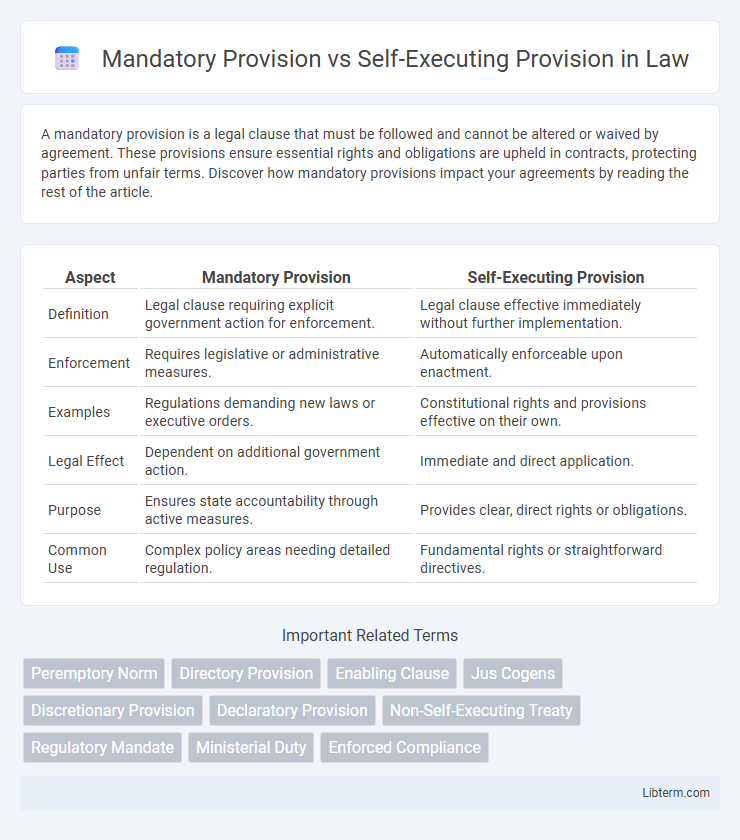A mandatory provision is a legal clause that must be followed and cannot be altered or waived by agreement. These provisions ensure essential rights and obligations are upheld in contracts, protecting parties from unfair terms. Discover how mandatory provisions impact your agreements by reading the rest of the article.
Table of Comparison
| Aspect | Mandatory Provision | Self-Executing Provision |
|---|---|---|
| Definition | Legal clause requiring explicit government action for enforcement. | Legal clause effective immediately without further implementation. |
| Enforcement | Requires legislative or administrative measures. | Automatically enforceable upon enactment. |
| Examples | Regulations demanding new laws or executive orders. | Constitutional rights and provisions effective on their own. |
| Legal Effect | Dependent on additional government action. | Immediate and direct application. |
| Purpose | Ensures state accountability through active measures. | Provides clear, direct rights or obligations. |
| Common Use | Complex policy areas needing detailed regulation. | Fundamental rights or straightforward directives. |
Introduction to Constitutional Provisions
Mandatory provisions in constitutional law are clauses that require explicit legislative or judicial action to be effective, ensuring that specific rights or duties are enforced by law. Self-executing provisions automatically grant rights or impose duties without the need for additional legislation, providing immediate legal effect upon ratification. Understanding these distinctions is crucial for interpreting the practical application and enforceability of constitutional mandates.
Defining Mandatory Provisions
Mandatory provisions are legal clauses that require strict compliance and cannot be altered or waived by the parties involved, ensuring essential protections or obligations under the law. These provisions are enforced by courts regardless of the parties' intentions, distinguishing them from self-executing provisions that automatically achieve legal effect without additional actions. Defining mandatory provisions is crucial in contract law, administrative regulations, and constitutional mandates to preserve public interest and legal consistency.
Understanding Self-Executing Provisions
Self-executing provisions operate automatically without the need for additional legislation or action, making them immediately effective upon the treaty's ratification. These clauses ensure that certain rights or obligations are directly enforceable within domestic legal systems, streamlining implementation and reducing legislative delays. Understanding self-executing provisions is crucial for interpreting the binding nature of international agreements and their immediate applicability in national courts.
Key Differences Between Mandatory and Self-Executing Provisions
Mandatory provisions require explicit legislative action or enforcement for implementation, ensuring laws are actively applied and followed. Self-executing provisions automatically take effect without additional legislative measures, providing immediate legal rights or obligations upon enactment. The key difference lies in enforcement dependency: mandatory provisions depend on further action, whereas self-executing provisions function independently once established.
Legal Implications of Mandatory Provisions
Mandatory provisions in law are rules that must be followed and cannot be altered or waived by parties, ensuring legal certainty and protecting public interest. These provisions often impose specific duties or restrictions that safeguard fundamental rights or regulatory standards, making any contractual terms that contravene them legally void and unenforceable. Failure to comply with mandatory provisions can lead to sanctions, nullification of agreements, or other legal consequences that uphold the supremacy of these non-negotiable legal norms.
Role of Self-Executing Provisions in Law
Self-executing provisions automatically enforce legal rights and obligations without requiring further legislative action, ensuring immediate applicability in courts. These provisions play a crucial role in upholding constitutional guarantees and international treaties by enabling direct invocation by individuals and authorities. Their intrinsic legal force contrasts with mandatory provisions, which demand additional legislative measures for implementation.
Judicial Interpretation of Mandatory vs Self-Executing
Judicial interpretation of mandatory provisions reveals courts strictly enforce these statutory requirements to uphold legislative intent, often limiting judicial discretion to ensure compliance. Self-executing provisions are interpreted as immediately effective without necessitating additional legislative action, allowing courts to apply them directly in resolving disputes. The distinction hinges on whether the provision requires further implementation, influencing courts' roles in enforcement and remedy determination.
Examples of Mandatory Provisions in Practice
Mandatory provisions, such as labor laws requiring minimum wage and occupational safety standards, compel compliance to protect workers' rights without the need for judicial enforcement. An example includes the Family and Medical Leave Act (FMLA), which obligates employers to grant unpaid leave for specific family and medical reasons, ensuring statutory entitlements are automatically enforceable. Environmental regulations mandating pollution control measures serve as another instance, where non-compliance results in legal sanctions regardless of intent or contract terms.
Case Studies Involving Self-Executing Provisions
Self-executing provisions in legal contexts automatically come into effect without requiring further legislative action, as illustrated in the landmark U.S. Supreme Court case Medellin v. Texas, where the Court ruled that certain treaty provisions were not self-executing and thus lacked direct domestic enforceability. In contrast, mandatory provisions stipulate explicit legislative or executive steps for implementation, demonstrated in the European Court of Human Rights rulings which frequently require states to enact specific legislation before rights can be fully realized. The practical impact of self-executing provisions can be seen in international investment arbitration cases such as Siemens AG v. Argentina, where treaty clauses directly facilitated investor protection without additional state measures.
Conclusion: Impact on Legal Systems
Mandatory provisions establish non-negotiable rules that ensure uniformity and stability within legal systems by preventing parties from opting out, which strengthens public policy enforcement and protects weaker parties. Self-executing provisions automatically apply without the need for legislative or judicial intervention, enhancing efficiency and predictability in legal processes while reducing administrative burdens. The impact on legal systems is profound, as mandatory provisions safeguard essential societal interests, whereas self-executing provisions streamline legal operations, together balancing flexibility and control in law enforcement.
Mandatory Provision Infographic

 libterm.com
libterm.com